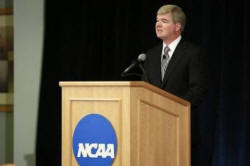|
 U.S.
judge rules against NCAA, says athletes can be paid U.S.
judge rules against NCAA, says athletes can be paid
 Send a link to a friend
Send a link to a friend
[August 09, 2014]
By Dan Levine and Jonathan Stempel
SAN FRANCISCO/NEW YORK (Reuters) - The
National Collegiate Athletic Association must allow universities to
offer student athletes a limited share of revenue, a U.S. judge ruled on
Friday, a decision that cuts to the heart of the NCAA's mission to
enforce amateurism in college sports.
|
|
 More than 20 current and former athletes filed an antitrust class
action against the NCAA, saying players should share in profits of
college athletics, a lucrative business in which universities reap
billions of dollars from football and basketball. More than 20 current and former athletes filed an antitrust class
action against the NCAA, saying players should share in profits of
college athletics, a lucrative business in which universities reap
billions of dollars from football and basketball.
U.S. District Judge Claudia Wilken in Oakland, California, on Friday
issued an injunction to allow students to recover some revenue
generated from use of their names, images and likenesses. Wilken did
not put the injunction on hold pending appeal, but said it will not
take effect until the start of the next recruiting cycle.
"I think we'll look back at this five years from now as the day that
college sports began to change. That's how important it is," said
Roger Abrams, a sports law professor at Northeastern University.
NCAA Chief Legal Officer Donald Remy said "we disagree" with the
court's ruling allowing athletes to share in revenue.
"We note that the Court's decision sets limits on compensation,"
Remy said, adding that "the NCAA is committed to fully supporting
student-athletes."

The ruling adds to the mounting legal, political and public pressure
for colleges to share the revenue athletic programs generate and
give student athletes better benefits. In April, football players at
Northwestern University became the first U.S. student athletes to
vote on whether to unionize.
The majority of college athletes do not go on to play
professionally. Critics say the NCAA's current scholarship policy
short-changes athletes who risk injury and devote many hours to
practice sessions, travel and competition.
On Thursday, the NCAA gave the five biggest college conferences
broader authority to set their own rules on areas such as
scholarships, insurance and travel for athletes' families.
The NCAA grosses roughly $770 million per year in media rights for
its annual Division I men's basketball tournament, known as March
Madness. Revenues are shared with member schools.
The richest conferences generate billions of dollars each year
exclusively for themselves through media contracts and their own
cable TV networks, primarily on the popularity of football and men's
basketball.
Wilken's ruling follows a three-week bench trial earlier this
summer. The lead plaintiff, Edward O'Bannon, won a national
basketball championship with UCLA in 1995. He testified during trial
that he usually spent about 40-45 hours per week on basketball and
"maybe about 12 hours" on academics.
[to top of second column] |

"I was an athlete masquerading as a student," O'Bannon said in
court.
In her order on Friday, Wilken wrote that inequities in college
sports could likely "be better addressed as a policy matter by
reforms other than those available as a remedy for the antitrust
violation found here."
However, Wilken still opted to issue an injunction. She ordered the
NCAA to allow schools to hold a limited share of licensing revenue
in trust for recruits, payable when they leave school or when their
eligibility expires.
The NCAA is still allowed to enforce rules that ban student-athletes
from endorsing commercial products, Wilken ruled.
Matthew Mitten, director of the National Sports Law Institute at
Marquette University Law School, said the ruling moves college
sports closer to the professional model.
"The amateur model that college sports has been is certainly on life
support," he said.
The case in U.S. District Court, Northern District of California is
Edward O'Bannon et al. vs. National Collegiate Athletic Association
et al., 09-3329.
(Additional reporting by Joseph Ax and Sarah McBride; Editing by
Mary Milliken and David Gregorio)
[© 2014 Thomson Reuters. All rights
reserved.] Copyright 2014 Reuters. All rights reserved. This material may not be published,
broadcast, rewritten or redistributed.

 |